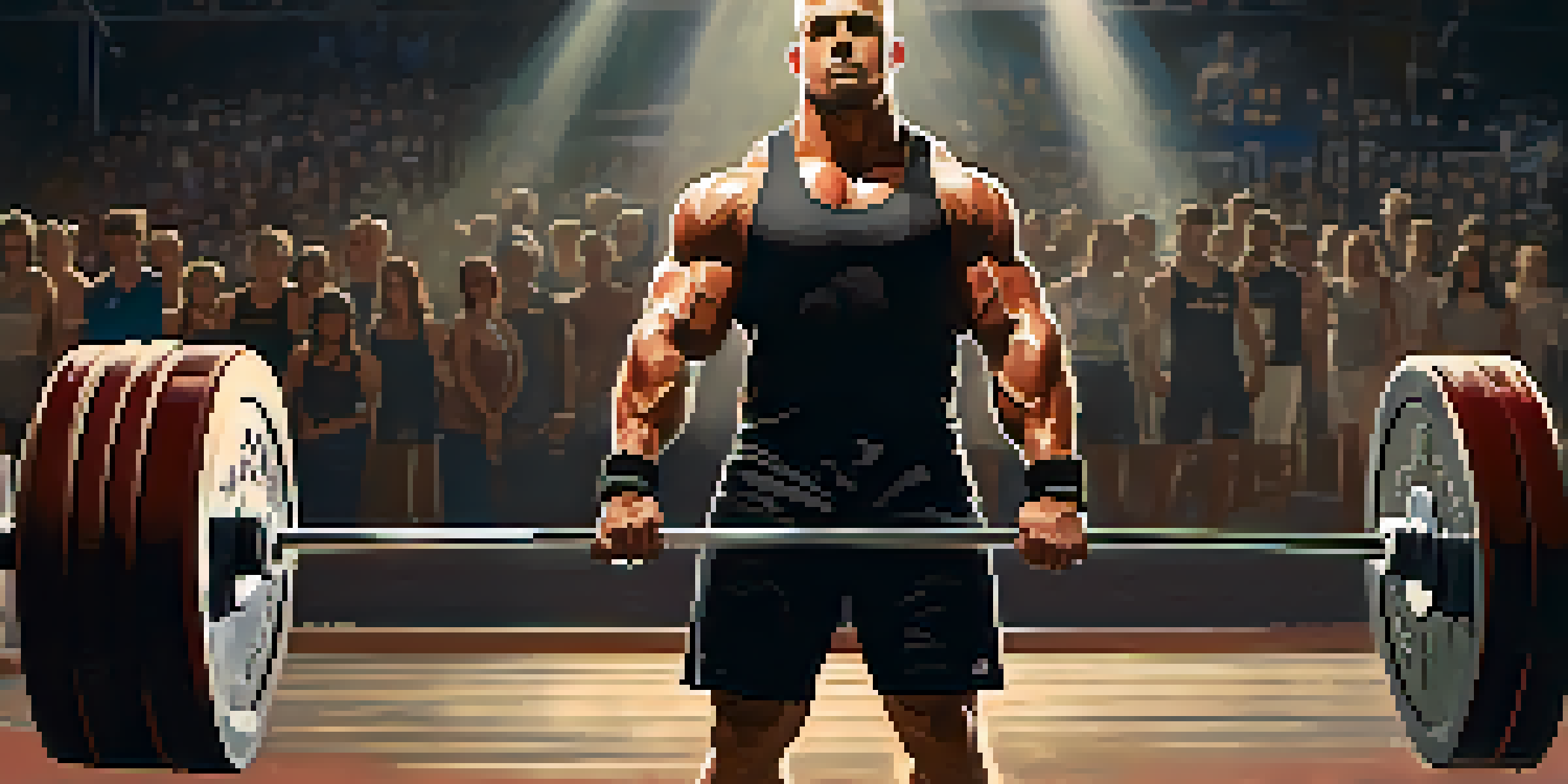The Impact of Performance Anxiety on Powerlifting Results

What is Performance Anxiety in Powerlifting?
Performance anxiety refers to the excessive worry about one's ability to perform well, particularly in high-stakes environments like competitions. In powerlifting, this anxiety can manifest in various ways, from physical symptoms like trembling hands to mental blocks that hinder focus. Understanding this anxiety is essential, as it can significantly affect an athlete's performance during competitions.
Anxiety is the handmaiden of creativity and the enemy of performance.
For instance, a lifter who usually excels in training might find themselves underperforming when the spotlight is on them. This discrepancy often stems from the pressure to achieve specific results, which can be overwhelming. Just like a musician might forget their notes in front of an audience, a powerlifter can struggle to execute their lifts due to anxiety.
Recognizing the signs of performance anxiety is the first step toward managing it. Athletes can benefit from identifying their triggers, whether they stem from personal expectations, competition pressure, or fear of judgment. By understanding these triggers, lifters can develop strategies to cope effectively.
The Psychological Effects of Performance Anxiety
Performance anxiety can lead to a range of psychological effects, including stress, frustration, and decreased self-confidence. When athletes are preoccupied with fear of failure, their focus shifts away from the task at hand, impacting their ability to lift effectively. This mental distraction can be likened to trying to drive a car while constantly checking the rearview mirror; it creates unnecessary obstacles.

Additionally, anxiety can amplify negative self-talk, causing lifters to doubt their abilities and question their training. This cycle of self-doubt can lead to a lack of motivation, creating a harmful feedback loop where anxiety and performance decline feed into each other. It's crucial for athletes to break this cycle to regain their confidence.
Understanding Performance Anxiety
Performance anxiety in powerlifting can hinder an athlete's performance due to excessive worry and physical symptoms.
To combat these psychological effects, many powerlifters turn to mindfulness and visualization techniques. These strategies help athletes focus on their breathing and visualize successful lifts, allowing them to regain a sense of control and calm. Similar to how a swimmer might mentally rehearse their strokes before a race, powerlifters can benefit from this mental preparation.
Physical Symptoms Associated with Performance Anxiety
Performance anxiety doesn't just affect the mind; it also manifests physically. Common symptoms include increased heart rate, muscle tension, and even gastrointestinal distress. These physical reactions can create a cycle where anxiety leads to poor performance, which in turn heightens anxiety levels—much like a snowball rolling downhill.
It's not the load that breaks you down, it's the way you carry it.
For example, a lifter may feel their heart racing before a big lift, which can lead to muscle tightness and reduced range of motion. This can make executing a lift more challenging, further feeding into their anxiety. Understanding these symptoms is vital for athletes, as they can learn to recognize and manage them effectively.
Incorporating relaxation techniques like deep breathing or progressive muscle relaxation can help mitigate these physical symptoms. Just as athletes warm up to prepare their bodies for lifting, they can also practice these techniques to calm their nerves before stepping onto the platform.
The Role of Coaching in Managing Performance Anxiety
Coaches play a pivotal role in helping powerlifters manage performance anxiety. A supportive coach can provide encouragement and reassurance, helping athletes feel more confident in their abilities. This relationship is vital, as a coach can offer constructive feedback while also recognizing when a lifter is struggling with anxiety.
For instance, a coach might implement a tailored warm-up routine that incorporates mental preparation. This could include discussing strategies for handling nerves, setting realistic goals, and reinforcing positive self-talk. By fostering a strong coach-athlete relationship, lifters can feel more secure and less anxious.
Coping Strategies for Lifters
Implementing techniques like visualization and goal setting can help powerlifters manage their performance anxiety effectively.
Moreover, a coach's experience can help athletes normalize their feelings of anxiety, reminding them that many competitors face similar challenges. Sharing stories of overcoming anxiety can create a sense of camaraderie and understanding, turning the experience into a shared journey rather than a solitary battle.
Developing Coping Strategies for Powerlifters
Developing effective coping strategies is essential for powerlifters dealing with performance anxiety. Techniques such as goal setting, visualization, and positive affirmations can empower athletes to take control of their mindsets. For example, breaking down a competition into smaller, manageable goals can reduce the overwhelming nature of the event.
Visualization is another powerful tool; athletes can mentally rehearse their lifts, which can create a sense of familiarity and ease anxiety. Just as a football player envisions scoring a touchdown before a game, powerlifters can benefit from picturing their successful lifts. This mental preparation can translate into improved performance.
Furthermore, incorporating routines before competitions can help establish a sense of normalcy and control. Whether it's a specific warm-up sequence or a set playlist, having a ritual can ground athletes and reduce anxiety. These routines can serve as anchors, keeping focus centered on performance rather than external pressures.
The Importance of Support Systems for Lifters
A strong support system can significantly alleviate performance anxiety for powerlifters. Friends, family, and training partners provide emotional support, encouragement, and constructive feedback. This network can be invaluable during competitions, reminding lifters that they are not alone in facing their challenges.
For example, having a training partner who understands anxiety can create a safe space for athletes to express their concerns. This support can foster a sense of camaraderie, allowing lifters to share their experiences and coping strategies. Much like a team cheering each other on during a game, this encouragement can boost confidence.
Role of Support Systems
A strong support system of friends, family, and coaches can significantly alleviate performance anxiety during competitions.
Moreover, sharing experiences with fellow lifters can help normalize feelings of anxiety. By discussing their struggles and strategies, athletes can learn from one another, building a community that supports mental well-being. This interconnectedness not only strengthens bonds but also enhances overall performance.
Long-term Effects of Performance Anxiety on Powerlifting
While some level of performance anxiety is normal, chronic anxiety can have long-term effects on a powerlifter's career. Persistent anxiety may lead to burnout, decreased motivation, and even injuries stemming from tension or poor technique. It's crucial for athletes to recognize when anxiety is becoming detrimental, rather than simply a part of competition.
In extreme cases, performance anxiety can lead some lifters to withdraw from competition altogether, feeling that their anxiety outweighs the joy of the sport. This can be disheartening for athletes who have invested so much time and effort into their training. Addressing performance anxiety early on can help prevent this outcome.

By employing coping strategies and seeking support, powerlifters can manage their anxiety effectively, preserving their passion for the sport. Just as athletes adapt their training to improve strength, they can also adapt their mental approach to ensure longevity in their powerlifting journey.